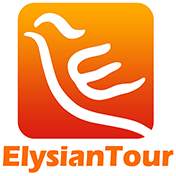Best Shopping Places in Beijing
Shopping is definitely a must-do when visiting Beijing. The capital city spoils shopaholics with abundant shopping options. Everywhere you go, you can see glitzy malls and department stores as well as high-end boutique shops. There are also various hutong streets and night markets where a number of time-honored quaint shops deep rooted in the city for hundreds of years.
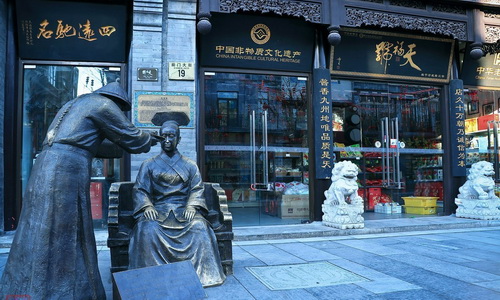
In Beijing, you can buy a wide range of articles to be home with, such as pearls, bags, clothes, art wares, antiques and jade jewels. For some pre-shopping inspirations, this article will detail the most popular shopping places and best picks in Beijing.
Within walking distance from Tiananmen Square and the Forbidden City, Wangfujing is the oldest and also the most popular shopping streets in Beijing. The 1,600-meter-long street is a bustling retail mecca with a mix of modern shopping malls and designer brands as well as the quaint shops.
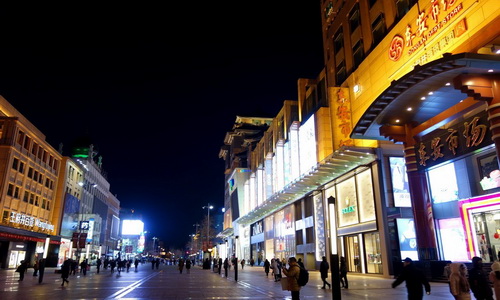
There are a huge selection of top luxury goods of international brands like Gucci, Louis Vuitton, and Armani. Oriental Plaza and Beijing APM are two biggest malls selling newest and cutting-edge commodities, while you might find that imported luxury goods are even more expensive than ones in your home country because of high tariffs and value-added taxes.
For foreign travelers, you are suggested to drop by some stylish Chinese shops for top quality hand-made wears like Shengfuxi, Tongshenghe and Ruifuxiang. Besides, you could search for some authentic local foods and drown yourself in the hustle and bustle of the hundred-year-old neighborhood.
Panjiayuan is the largest flea market in Beijing, which is also a hot tourist destination of itself. The antique market is a must-visit for both the serious collectors hunting for authentic Chinese treasures and the casual strollers swooping for unique souvenirs.
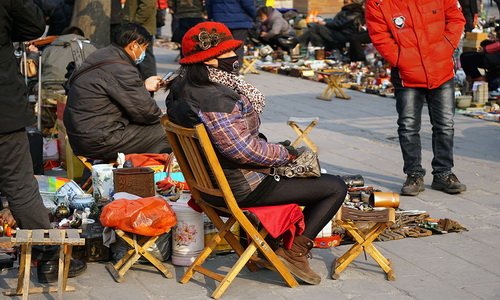
With over 3000 shops and stalls, Panjiayuan Antique Market offers all the trinkets you've ever dreamed of owning from China, such as porcelain vase, teapots, calligraphy and painting works, jewel beads, Buddha statues and Cultural Revolution-era memorabilia.
Antique shops are open every day, while the street stalls mainly gather on Saturdays and Sundays when an array of vendors set up stalls on mats on the ground brimming with dazzling trinkets. Bargaining in Panjiayuan Flea Market is allowed and definitely recommended, and it is a great experience that you would expect to find at a bazaar.
Near the U.S. Embassy, the Silk Street is an open-air market popular with foreigners, which allows you to fulfill your wildest shopping dream via bargaining in Beijing. It is a big shopping complex crammed with name brand clothing and accessories, shoes, sunglasses, luggage, house wares, toys and handicrafts.
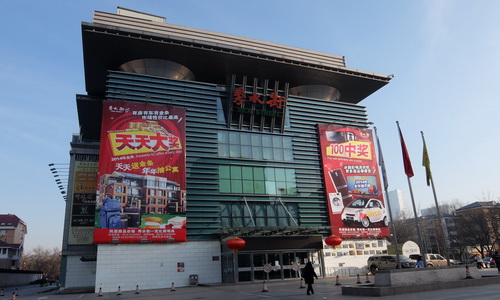
The reason why Silk Street is so popular with tourists might be that many flawless international designer brand knock-offs can be found here. Therefore, you shall never trust any labels or rely on the price tags but expect to haggle hard over prices.
Some local shop owners could speak several foreign languages, and they would try to make the sale at any cost. Thus bargain is a great way to get what you want at a nice price. It is never a browsing-type shopping experience, as most tourists I see are loaded down with something to leave.
Located in the center of Beijing, Qianmen Street is one of the oldest commercial streets with a history of over 600 years. It is a place where trend meets tradition by housing a cluster of shinny shops in traditional Chinese architecture.
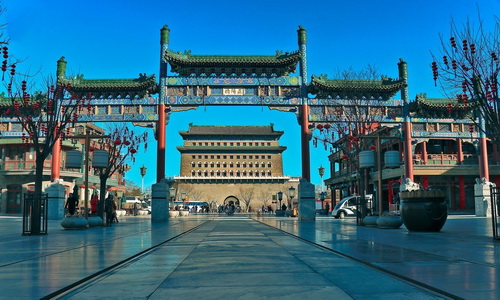
Tucked away in the ancient-style buildings, you can see a mix of modern international brands and some time-honored Chinese stores for silk, curios, souvenirs, herb medicines and teas. It is a superb place to seek out traditional Beijing handicrafts like Neiliansheng Cloth Shoes. Famous restaurants like Yitiaolong, Douyichu and especially Quanjude would offer you a great respite from shopping.
For an extra special treat, you could also take an old-fashioned tram running through the street. Qianmen Street could be easily accessible by public transport, and it is more photographic for a stroll at late night with the vintage lights.
Similar to Wangfujing, Xidan is one of the busiest commercial streets stretching from Xuanwumen to Lingjing Hutong. It is a consumer paradise featuring mega-malls, upmarket shops, decent dining establishments and fulfilled entertainments.
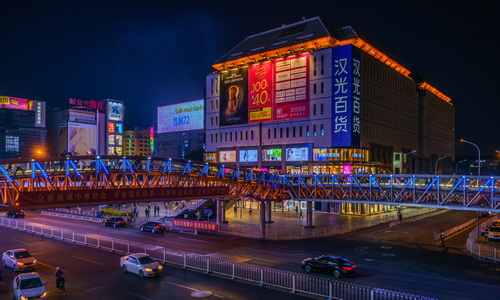
You could not only go on a crazy shopping spree for many big brands and small boutiques standing side by side in this modern shopping quarter, but also hitting up some of the most diverse and authentic eateries that the capital city has to offer. Evening is the best time to seize the glitter and glamour of Xidan when it turns pretty fabulous with lights on. However, you shall not visit it at weekends when it is swarmed with young people who are hunting for fashion and pleasure.
Known as Yandai Xiejie in Chinese, the Skewed Tobacco Pouch Street is one of the oldest commercial street hidden in the core lanes of Beijing Shichahai area. The 200-meter-long street used to be a market with shops famous for tobaccos, long-stemmed pipe snuffs, smoking sets, framed calligraphy and paintings as well as antique jade wares in Qing Dynasty (1644 - 1912).
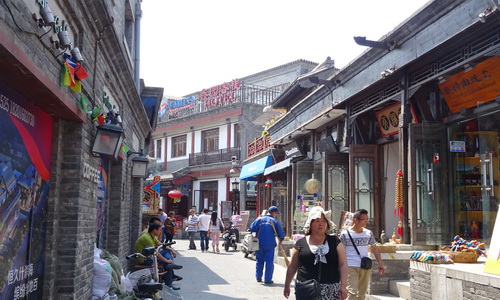
Now you can still sense its authentic flavor of old Beijing while browsing through antique shops, tea houses, clock stores, galleries and snack stalls arrayed in the 800-year old hutong neighborhood. For shopping, you are strongly recommended to pick a tiny snuff bottle famous for the inside miniature paintings or a vintage pocket watch which will occupy no real estate of your bags. If lucky, you might have a chance to see local folk artists doing paper cutting, blowing a sugar figurine or making a dough doll.
Facing the Beijing West Railway Station, Maliandao Tea Street is the best place for foreign travelers to purchase some top-quality teas and learn about Chinese rich tea culture. There are more than 100 tea shops providing thousands of different kinds of teas from all over China.
Most shops offer free tea tasting experience, and some owners are even glad to brief you on the tips on how to distinguish the quality of tea and how to sip a cup of tea like an expert. You can find a good variety of Chinese famous teas, such as Anxi Tieguanyin Tea, West Lake Dragon Well Tea and Maofeng Tea. Many quaint shops also sells exquisite tea sets that could be brought home as lovely gifts.
- Many of the department stores, malls and boutique shops could send the purchased goods to your home through oversea mail service.
- Credit cards like Visa, MasterCard, AE and JCB are widely accepted in Beijing, but do prepare some cash for purchases from street vendors.
- Bargaining is an important way of shopping. Pick up your courage and bargain hard to get a better rate.
- In markets and bazars like Silk Market, there are a lot of name brand goods which are actually knock-offs.
- Always ask the price first in case of being ripped off since some shops have no price tags or labels for their commodities.
- Different from western countries, China has a very stingy refund policy even at a high-end department store. Usually you can only exchange an article within a week of purchase and make sure it is in perfect state with the receipt.
- Foreign visitors could take advantage of the tax refund policy in Beijing. So far, there are more than 200 tax free shops in Wangfujing and Xidan of Beijing, such as Gongmei Group, Wangfujing Department Store, Dong'an Department Store, and Wuyutai Tea Shop.

